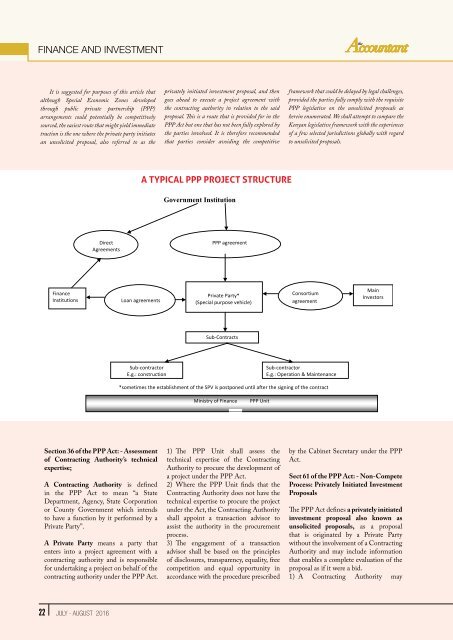The-Accountant-Jul-Aug-2016
Create successful ePaper yourself
Turn your PDF publications into a flip-book with our unique Google optimized e-Paper software.
FINANCE AND INVESTMENT<br />
It is suggested for purposes of this article that<br />
although Special Economic Zones developed<br />
through public private partnership (PPP)<br />
arrangements could potentially be competitively<br />
sourced, the easiest route that might yield immediate<br />
traction is the one where the private party initiates<br />
an unsolicited proposal, also referred to as the<br />
privately initiated investment proposal, and then<br />
goes ahead to execute a project agreement with<br />
the contracting authority in relation to the said<br />
proposal. This is a route that is provided for in the<br />
PPP Act but one that has not been fully explored by<br />
the parties involved. It is therefore recommended<br />
that parties consider avoiding the competitive<br />
framework that could be delayed by legal challenges,<br />
provided the parties fully comply with the requisite<br />
PPP legislative on the unsolicited proposals as<br />
herein enumerated. We shall attempt to compare the<br />
Kenyan legislative framework with the experiences<br />
of a few selected jurisdictions globally with regard<br />
to unsolicited proposals.<br />
A TYPICAL<br />
A TYPICAL<br />
PPP<br />
PPP<br />
PROJECT<br />
PROJECT STRUCTURE<br />
STRUCTURE<br />
Government Institution<br />
Direct <br />
Agreements <br />
PPP agreement <br />
Finance <br />
Institutions <br />
Loan agreements <br />
Private Party* <br />
(Special purpose vehicle) <br />
Consortium <br />
agreement <br />
Main <br />
Investors <br />
Sub-‐Contracts <br />
Sub-‐contractor <br />
E.g.: construction <br />
Sub-‐contractor <br />
E.g.: Operation & Maintenance <br />
*sometimes the establishment of the SPV is postponed until after the signing of the contract <br />
Ministry of Finance <br />
4 <br />
PPP Unit <br />
Section 36 of the PPP Act: - Assessment<br />
of Contracting Authority’s technical<br />
expertise;<br />
A Contracting Authority is defined<br />
in the PPP Act to mean “a State<br />
Department, Agency, State Corporation<br />
or County Government which intends<br />
to have a function by it performed by a<br />
Private Party”.<br />
A Private Party means a party that<br />
enters into a project agreement with a<br />
contracting authority and is responsible<br />
for undertaking a project on behalf of the<br />
contracting authority under the PPP Act.<br />
1) <strong>The</strong> PPP Unit shall assess the<br />
technical expertise of the Contracting<br />
Authority to procure the development of<br />
a project under the PPP Act.<br />
2) Where the PPP Unit finds that the<br />
Contracting Authority does not have the<br />
technical expertise to procure the project<br />
under the Act, the Contracting Authority<br />
shall appoint a transaction advisor to<br />
assist the authority in the procurement<br />
process.<br />
3) <strong>The</strong> engagement of a transaction<br />
advisor shall be based on the principles<br />
of disclosures, transparency, equality, free<br />
competition and equal opportunity in<br />
accordance with the procedure prescribed<br />
by the Cabinet Secretary under the PPP<br />
Act.<br />
Sect 61 of the PPP Act: - Non-Compete<br />
Process: Privately Initiated Investment<br />
Proposals<br />
<strong>The</strong> PPP Act defines a privately initiated<br />
investment proposal also known as<br />
unsolicited proposals, as a proposal<br />
that is originated by a Private Party<br />
without the involvement of a Contracting<br />
Authority and may include information<br />
that enables a complete evaluation of the<br />
proposal as if it were a bid.<br />
1) A Contracting Authority may<br />
22 JULY - AUGUST <strong>2016</strong>

















